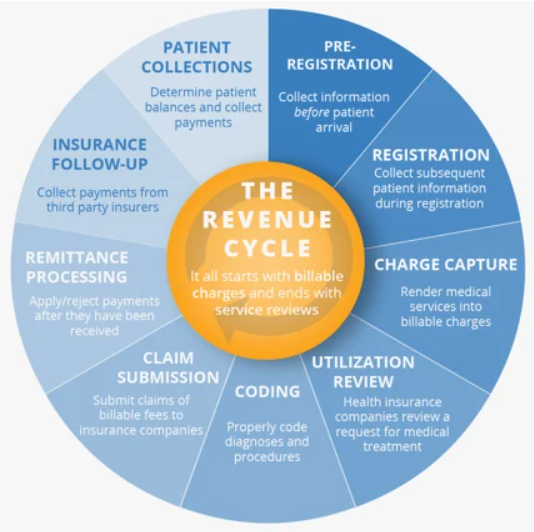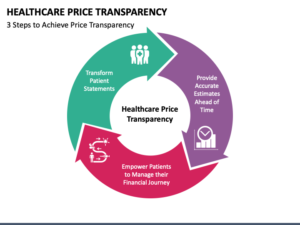In the ever-evolving landscape of healthcare, efficient financial management is crucial for healthcare providers to deliver quality care and sustain their operations. Healthcare Revenue Cycle Management (RCM) has emerged as a powerful tool in this regard.
RCM encompasses the management of financial processes, from the moment a patient schedules an appointment to the point when all payments are received and processed. This blog delves into the comprehensive benefits of Healthcare RCM, shedding light on how it can transform healthcare institutions and improve patient care.
Understanding Healthcare Revenue Cycle Management:
Healthcare Revenue Cycle Management is a systematic approach that healthcare providers use to manage administrative and clinical functions associated with claims processing, payment, and revenue generation. It spans various stages, including patient registration, eligibility verification, charge capture, claims submission, payment posting, denial management, and patient collections.
Benefits of Healthcare Revenue Cycle Management:
- Improved Financial Performance:
Efficient RCM processes contribute significantly to a healthcare organization’s financial health. By streamlining billing and collection procedures, healthcare providers can reduce revenue leakage, minimize claim denials, and accelerate payment cycles. This leads to improved cash flow, higher revenues, and increased profitability, enabling organizations to invest in better facilities and healthcare technology.
- Reduced Claim Denials:
Claim denials are a common challenge in the healthcare industry. Errors in billing, coding, and documentation can lead to denials, causing delays in reimbursement. Healthcare Revenue Cycle Management systems use advanced analytics and coding tools to reduce errors and ensure claims are submitted correctly. This results in fewer denials and faster payments, ultimately enhancing the revenue stream.
- Enhanced Efficiency:
RCM processes automate and streamline administrative tasks, reducing the burden on staff and minimizing the risk of errors. This efficiency allows healthcare providers to allocate resources more effectively, focusing on patient care rather than administrative tasks. It also simplifies the patient experience, as streamlined processes lead to quicker appointments and billing.
- Cost Savings:
By optimizing operations, Healthcare Revenue Cycle Management systems can help organizations reduce their operational costs. This includes savings on administrative staff, reduced paper usage, and lower costs associated with denied claims. The cost savings can be reinvested in improving patient care, purchasing advanced medical equipment, and expanding services.
- Transparency and Accountability:
Healthcare Revenue Cycle Management systems provide transparency in the revenue cycle by offering real-time insights into billing and financial data. This transparency helps in identifying bottlenecks and areas that require improvement. With clearly defined roles and responsibilities, healthcare providers can establish accountability among staff, ensuring that each step of the revenue cycle is executed efficiently.
- Compliance and Regulatory Adherence:
Healthcare Revenue Cycle Management systems help providers stay compliant with ever-evolving healthcare regulations. They can integrate the latest coding and billing standards, reducing the risk of non-compliance. This is especially important as regulatory changes can lead to penalties and legal challenges for non-compliant organizations.
- Better Patient Experience:
Efficient RCM processes contribute to an improved patient experience. Patients appreciate transparent billing, quick insurance verification, and streamlined payment options. This can enhance patient satisfaction and trust in healthcare providers, leading to increased loyalty and referrals.
- Data Analytics and Reporting:
Healthcare Revenue Cycle Management systems offer advanced analytics and reporting capabilities. Providers can access real-time data to make informed decisions about their revenue cycle. Analytics can help identify trends, track performance metrics, and spot areas for improvement, ultimately leading to better financial outcomes.
- Faster Revenue Collection:
The traditional revenue cycle involves a series of manual processes, leading to delays in revenue collection. RCM systems expedite these processes, enabling healthcare organizations to collect payments more quickly. This is particularly valuable in healthcare, where prompt payment is essential for maintaining operations.
- Scalability and Growth:
Efficient RCM processes are scalable, allowing healthcare organizations to adapt to changes in patient volume and expand their services. As an organization grows, its RCM system can grow with it, accommodating increased patient numbers and revenue streams seamlessly.
Challenges in Implementing Healthcare Revenue Cycle Management:
While the benefits of Healthcare RCM are clear, implementing these systems can present challenges for healthcare providers. Some of the common obstacles include:
- Initial Costs: Implementing a Healthcare RCM system can be costly, including the expense of software, staff training, and potential disruptions in current processes.
- Resistance to Change: Healthcare staff may resist the shift towards more automated processes. Effective change management strategies are crucial to ensure a smooth transition.
- Integration: Integrating RCM software with existing Electronic Health Record (EHR) systems and other healthcare software can be complex.
- Data Security: Healthcare RCM systems handle sensitive patient data, so security and compliance with Health Insurance Portability and Accountability Act (HIPAA) regulations are paramount.
- Ongoing Maintenance: RCM systems require regular updates and maintenance to remain effective, which can be a long-term commitment.
Conclusion:
Healthcare Revenue Cycle Management is more than just a tool to manage finances; it’s a comprehensive approach that enhances the financial health of healthcare organizations, improves patient experiences, and ensures compliance with ever-changing healthcare regulations.
The benefits of Healthcare Revenue Cycle Management are far-reaching, from improving financial performance to reducing claim denials, increasing efficiency, and providing transparency in the revenue cycle. While there are challenges in implementing RCM systems, the long-term rewards in terms of cost savings, better patient care, and sustainable growth make it a valuable investment for healthcare providers looking to thrive in a competitive industry.








